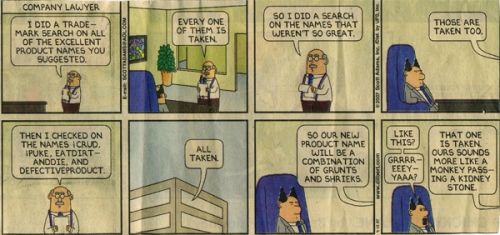How to find a good URL without having a brain hemorrhage

I was recently featured in an article by Max Chafkin in the July issue of Inc. Magazine. The article, Good Domain Names Grow Scarce, is about how it is becoming increasingly hard to find a name that has a good URL to go along with it. This is a problem that most of us are acutely familiar with. More and URLs urls get registered everyday. Throw squatters and domain parkers into the mix and finding a URL has turned into a painstaking, rejection filled exercise that gives you flashbacks of senior prom.
So if you’ve been banging your head against your keyboard trying to find a nonsensical combination of letters and numbers that has an available dot com, here are a few things that might help you end this conflict peacefully.
1. Get your priorities straight:
Look, we all know it’s hard to find a straightaway dot com. This means that most people who spend any time on the internet are pretty tolerant and forgiving when it comes to URLs. That said, not everyone needs a URL as pure as the driven snow. While it’s clearly the first choice to have yourcompanyname.com, it isn’t always necessary. First you need to think about how your core audiences will end up at your website. Will you speak with them first? Will they see you in an online banner ad? Will they search for you on Google? In most of these cases, they won’t be directly typing your URL into the browser—they’ll have some help. If people want to find you chances are they will (even if you’re a startup). For most businesses, the type of person who would attempt to type your URL directly into Firefox, fail, and then give up, doesn’t really sound like the type of person you should be focusing your energy on. If your entire business doesn’t exist exclusively on the internet, you’re probably better off finding a strong name that grabs peoples attention and then finding a URL that works. Most people understand the reality of getting a URL these days and won’t hold it against you if you don’t have a pure dot com. If you’re confident in what you’re doing and have a solid plan, having a slightly modified URL isn’t going to spell disaster for your business.
2. Be flexible and creative with url extensions
Having a dot net is not the end of the world—very far from it. There are thousands of very successful businesses that use dot net or some other creative url extension. As long as the dot com isn’t a successful or related business, a dot net address is a viable option. I know some people think that if you don’t have a dot com, customers will think you don’t have a serious business. To them I say that a URL isn’t the only way to show people you have a serious business. Having a well-designed site certainly helps, and so does a little publicity. Some very successful sites that didn’t worry about having a dot com include americanapparel.net, last.fm, bit.ly, brandtags.net, good.is and elbo.ws. Again, if people are using a search engine to find you, having a dot net isn’t really going to be a big deal. In the case of Good and Elbows, they used the country extensions for Iceland and Samoa in their urls. In most cases you don’t have to do business in a country in order to use their extensions and you can create some pretty interesting options that are probably available. Other potentially useful extensions are: .as, .at, .be, .by, .co, .ee, .in, .it, .ly and .to. You can view all of them here.
3. Longer words and phrases have higher success rates
Having a slightly longer name dramatically increases the chances of you finding an available URL. Be poetic, be descriptive, think of a short phrase, attract some attention. People are generally tolerant of longer URLs if they aren’t excessively long or hard to spell. Short URLs are going the way of the dodo. Less than one percent of all four letter URLs are currently available. yqlh.com is taken, so is uzwq.com and gqwv.com. After five minutes of searching, I couldn’t actually find an available four letter URL. Good luck finding a short series of letters that actually makes a pronounceable sound. That said, longer names allow you to convey some meaning and actually feel comfortable saying the name of your business in public.
4. Hire a naming company
Some people actually do this for a living. (Disclaimer: I happen to be one of them.) If you’re having a really tough time coming up with a good name or URL, sometimes it’s nice to take the weight off your shoulders and get some help. Whether you’re naming a nonprofit or need hemp business name ideas, we can help. You probably have something better to be doing anyway.
5. Buy your own extension
Recently ICANN (the nonprofit that controls domain extensions) voted to expand top-level domains (TLDs). For a handsome fee, you can buy your own extension as long as it’s less than 64 characters. Extensions will also be available in Cyrillic, Arabic and Chinese. This will definitely have a serious impact on the landscape of URLs. Either way, it’s hard to imagine that having a dot com for your business in 20 years will be as important as it is today.
